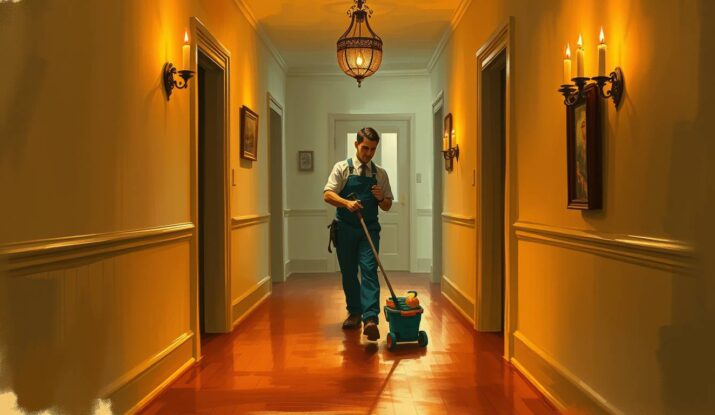A proper end-of-tenancy clean matters more than most tenants realize. Landlords expect the property to be returned in the same clean condition it was handed over. It’s not just about tidiness—it directly impacts your deposit and the final inspection report. Missed spots like skirting boards, oven interiors, or bathroom tiles can lead to deductions. A thorough clean shows respect for the agreement and avoids last-minute disputes. For landlords, it ensures the place is ready for the next tenant without delay. Meeting these expectations can save time, money, and stress for both sides.

Why End-of-Tenancy Cleaning Matters
End-of-tenancy cleaning plays a big role in making the move-out process smoother for both the landlord and tenant. It goes beyond basic cleaning—this is about presenting the property in a condition that meets the rental agreement.
During the final property inspection, landlords assess everything from the kitchen and bathroom to floors, windows, and hard-to-reach corners. If dirt, stains, or leftover items are found, landlords may record them as issues in the inspection report. This directly affects how much of the tenant’s deposit is returned.
For tenants, a clean property is the easiest way to protect their deposit. Most disputes between landlords and tenants come down to cleanliness. Skipped areas like inside the fridge, under furniture, or limescale in bathrooms are common reasons for deductions.
Professional cleaners can help avoid these problems. They understand what landlords look for and often follow checklists that meet agency standards. Hiring a trusted service reduces the risk of oversights and shortens the time between moving out and getting the deposit back.
In short, proper cleaning is a win-win—landlords get a ready-to-rent space, and tenants leave with peace of mind and their full deposit intact.
Landlord Cleaning Expectations: The Checklist
When it comes to end-of-tenancy cleaning, landlords typically follow a detailed checklist to ensure the property is in top condition for the next tenant. This checklist sets the cleaning standards tenants are expected to meet before handing over the keys.

Room-by-Room Expectations:
- Living Room & Bedrooms: Dust all surfaces, clean light fixtures, wipe down skirting boards, and vacuum carpets or mop floors. Any stains on the walls or floors should be removed if possible.
- Kitchen: This area requires deep cleaning. Landlords expect grease-free countertops, spotless sinks, a clean oven, wiped-down cabinets (inside and out), defrosted fridges, and sanitized appliances.
- Bathroom: Scrub toilets, sinks, bathtubs, and tiles thoroughly. Remove all limescale and mold. Mirrors should be streak-free, and extractor fans dusted.
- Hallways & Stairs: Clean walls, handrails, and flooring. Don’t forget corners and behind radiators.
Additional Focus Areas:
- Windows: Inside glass should be cleaned and frames wiped down.
- Walls & Floors: Remove scuffs where possible. While some wear is expected, heavy marks or damage must be addressed.
- Appliances: Dishwashers, washing machines, and microwaves should be cleaned inside and out.
Expected Cleanliness vs. Normal Wear:
Landlords understand that some wear and tear is natural—slightly worn carpets or faded paint, for example. However, dirt, grime, and neglect are not acceptable. Meeting the end-of-tenancy cleaning checklist helps tenants avoid deductions and ensures landlords receive the property back in rentable condition.
The End of Tenancy Cleaning Checklist (with Examples)
A clear and detailed End of Tenancy Cleaning Checklist is your best tool for ensuring a smooth handover. Landlords and letting agents expect every inch of the property to meet high cleaning standards. Here’s a sample breakdown by room, along with cleaning product tips and what’s considered “professionally cleaned.”

Living Room & Bedrooms:
- Dust and wipe all surfaces, including furniture
- Vacuum carpets, including under furniture
- Clean skirting boards and light switches
- Remove cobwebs and marks from walls
Kitchen:
- Degrease and clean the oven, hob, and extractor fan
- Wipe down all countertops and cabinet interiors
- Clean the fridge/freezer (defrost if needed)
- Scrub sink and taps with limescale remover
- Sanitize appliances (dishwasher, microwave, kettle)
Bathroom:
- Remove limescale from showerheads, tiles, and taps
- Clean and disinfect toilet, sink, and bathtub
- Polish mirrors and chrome fixtures
- Mop floors and wipe tile grout
Hallways & General Areas:
- Vacuum or mop floors
- Wipe down doors and handles
- Clean windows and sills
- Check light fixtures for dust
Recommended Cleaning Products:
- Multi-surface disinfectant spray
- Oven cleaner (heavy-duty degreaser)
- Limescale remover for bathrooms
- Glass cleaner for mirrors and windows
- Microfiber cloths and scrubbing pads
What Landlords Consider “Professionally Cleaned”:
A property that smells fresh, is free of dust, grime, and limescale, with spotless surfaces and appliances. There should be no visible signs of dirt or stains anywhere.
Cleaning Guarantees:
Some cleaning agencies offer a “Cleaning Guarantee,” promising to re-clean any areas the landlord is not satisfied with—this helps avoid disputes and gives tenants peace of mind.
DIY vs. Professional Cleaning: What Landlords Prefer

When it comes to DIY Cleaning vs Professional Cleaning, many tenants debate whether to roll up their sleeves or hire a professional cleaning agency. While doing it yourself may seem cost-effective, landlords often prefer the results that come with hiring professional cleaners.
Let’s break it down:
Cost Comparison
DIY cleaning costs less upfront—just cleaning supplies and your time. But professional cleaning fees usually include deep-cleaning equipment, specialized products, and trained staff.
Time and Effort
End-of-tenancy cleaning is time-consuming. Scrubbing ovens, descaling bathroom tiles, and deep cleaning carpets can take an entire weekend. Professional cleaners handle it efficiently, often finishing in just a few hours.
What Landlords Trust More
Landlords are more likely to trust professional cleaners because they follow a strict checklist and know what property managers look for. They’re also less likely to miss hidden areas like behind appliances or inside extractor fans.
Risk of Missed Areas in DIY Jobs
Missed spots during DIY cleaning—like streaky windows, greasy hobs, or limescale in the bathroom—can lead to deductions from your deposit.
Cleaning Guarantees
Professional cleaning companies often provide a cleaning guarantee. If the landlord isn’t satisfied, they’ll return and re-clean at no extra charge—something DIY can’t offer.
How Long Should an End-of-Tenancy Clean Take?
- The cleaning duration for an end-of-tenancy clean depends on the size and condition of the property. On average, a one-bedroom flat takes 3–5 hours to clean thoroughly. A three-bedroom house may require 6–10 hours or more, especially if deep cleaning of appliances, carpets, and bathrooms is involved.
- Letting agencies and landlords expect the cleaning to be completed promptly, ideally before the final inspection. Any delays—like incomplete rooms or overlooked grime—can be seen as unacceptable and may delay deposit returns or even lead to penalties.
- Hiring a cleaning agency can save time and hassle. These professionals often work in teams and follow a detailed checklist aligned with cleaning standards expected by letting agents. To speed things up, prep the space beforehand by removing personal items, defrosting the fridge, and ensuring access to all areas. It’s a smart move that makes a big difference.
The Role of the Tenancy Agreement & Inventory Report
The tenancy agreement plays a crucial role in setting expectations for cleaning standards at the end of a tenancy. Many agreements include a cleaning clause, which outlines the level of cleanliness required before moving out. This clause helps clarify both the tenant’s and landlord’s responsibilities for the final clean.
The inventory report is another key document. It provides a detailed record of the property’s condition at the start of the tenancy, including notes on cleanliness, wear, and any existing damages. When it’s time for the tenant to move out, this report is compared with the current state of the property.
Fair wear and tear refers to the natural deterioration of items due to age or use. Landlords cannot charge tenants for this, but neglect or damage beyond this threshold, such as stains on carpets or broken appliances, may lead to deductions from the deposit.
Proper documentation, including the inventory report and tenancy agreement, is vital in resolving disputes. It ensures that both parties have a clear understanding of expectations and a record of the property’s condition, reducing the potential for disagreements over cleaning responsibilities and deposit deductions.
Common Disputes Over Cleaning
Cleaning-related disputes between tenants and landlords are common, particularly when it comes to deposit deductions after a property inspection. One of the main points of contention is whether the property has been cleaned to the required standard, as outlined in the tenancy agreement.
Typical issues include missed areas like ovens, carpets, and windows, which are often overlooked in DIY cleans. Landlords may deduct from the deposit if these areas aren’t cleaned thoroughly, citing them as part of the end-of-tenancy cleaning checklist.
Common examples of cleaning-related deductions are charges for dirty carpets, uncleaned kitchen appliances, and walls with stains or marks.
To avoid conflict, tenants should carefully follow the cleaning guidelines in the tenancy agreement and consider using professional cleaners who can ensure all areas are addressed. Landlords can also provide a cleaning checklist to help clarify expectations.
Letting Agency Standards and Landlord Preferences
Letting agencies often demand strict cleanliness standards to ensure properties are in top condition for the next tenants. Agencies typically follow set guidelines that may be stricter than those of individual landlords, as they manage multiple properties and need to maintain consistent quality.
The expectations of an agency may differ from a landlord’s, as agencies tend to focus more on uniform standards and may have specific requirements for each room. Landlords, on the other hand, might be more lenient or have personal preferences for certain areas.
Using a cleaning agency or professional cleaners recommended by the agency helps guarantee that all cleanliness standards are met. These professionals are experienced in meeting industry expectations and may even offer a cleaning guarantee, reducing the risk of deposit disputes. For both landlords and tenants, hiring a recommended service can save time and ensure a smooth end-of-tenancy process.
What Happens If You Don’t Meet Landlord Expectations?
Failing to meet landlord expectations during an end-of-tenancy clean can result in deposit deductions. If areas are missed or not cleaned to the required standard, the landlord may charge re-cleaning fees or deduct money from the deposit to cover the cost of professional cleaning services.
In some cases, partial or full deposit loss may occur if the property’s cleanliness is deemed unsatisfactory after the property inspection. To challenge an unfair deduction, tenants should gather evidence, including before-and-after photos, showing the condition of the property.
Having these photos can help dispute any claims that cleaning standards weren’t met. It’s crucial to document everything to avoid potential disputes and protect your deposit.
Hiring a Cleaning Agency That Understands Landlord Standards
When hiring a cleaning agency for end-of-tenancy cleaning, it’s essential to choose one that understands landlord expectations. A professional cleaning service can ensure every corner of the property meets the high standards required for a smooth handover.
Look for agencies that offer a cleaning guarantee, meaning they’ll return to re-clean if the landlord finds any issues. This gives peace of mind, especially when the cleaning involves areas like the kitchen or bathroom, which can be particularly scrutinized.
Professional cleaners are familiar with the specific cleaning requirements landlords expect, from spotless appliances to freshly cleaned carpets. They also understand the importance of documentation (e.g., photos) to confirm the property’s condition. By hiring a trusted cleaning agency, tenants can avoid the risk of losing part of their deposit due to missed areas or inadequate cleaning.


